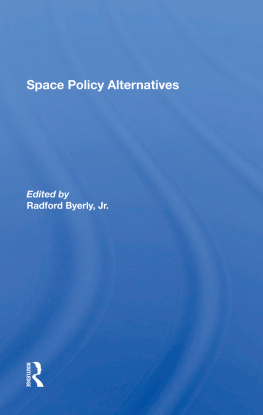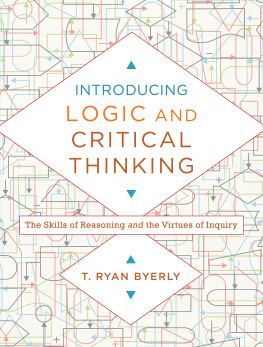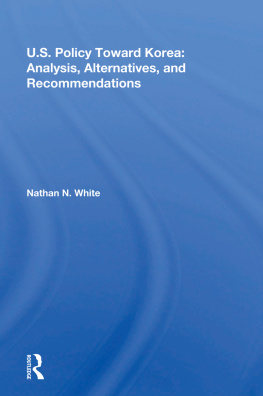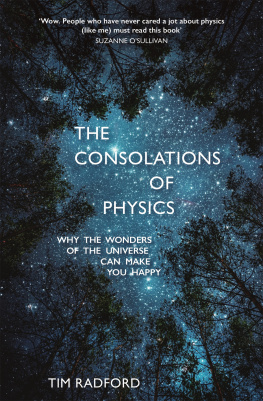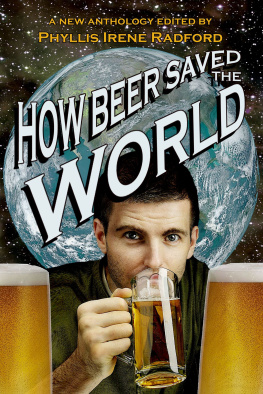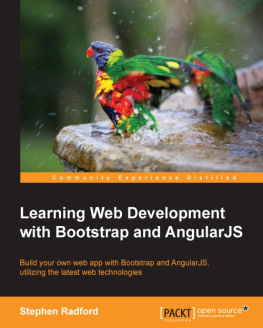Space Policy Alternatives
Published in cooperation with the Center for Space and Geosciences Policy, University of Colorado, Boulder
Space Policy Alternatives
Edited by
Radford Byerly, Jr.
First published 1992 by Westview Press
Published 2019 by Routledge
52 Vanderbilt Avenue, New York, NY 10017
2 Park Square, Milton Park, Abingdon, Oxon OX14 4RN
Routledge is an imprint of the Taylor & Francis Group, an informa business
Copyright 1992 by Taylor & Francis
All rights reserved. No part of this book may be reprinted or reproduced or utilised in any form or by any electronic, mechanical, or other means, now known or hereafter invented, including photocopying and recording, or in any information storage or retrieval system, without permission in writing from the publishers.
Notice:
Product or corporate names may be trademarks or registered trademarks, and are used only for identification and explanation without intent to infringe.
Library of Congress Cataloging-in-Publication Data
Space policy alternatives / edited by Radford Byerly, Jr.
p. cm. (Westview special studies in science, technology,
and public policy)
Includes bibliographical references and index.
ISBN 0-8133-8618-7
1. Astronautics and stateUnited States. I. Byerly, Radford.
II. Series.
TL789.8.U5S587 1992
338.9'4'0973dc20 92-25347
CIP
ISBN 13: 978-0-367-28848-8 (hbk)
In 1989 I edited a somewhat similar group of essays published by Westview under the title Space Policy Reconsidered. The preface to that volume began with this statement:
For some time space policy debate has been too constrained by preexisting assumptions and programs. There is also a related need for a community of independent space policy analysts in order to inform those discussions. The aim of this book is to take a step toward meeting such needs.
That statement is repeated here because it is still valid and this book is intended to address the same unmet needs.
Initial drafts of these contributions were prepared before the Augustine Commission released its excellent report and, although they were revised afterwards, for the most part they do not reflect that report. Part of the reason for this is that although Augustine could and perhaps should have initiated a thoughtful debate on space policy, it did not. As discussed in the Introduction, the Augustine report has had much less impact than one would have thought, although it is often referenced. Thus this volume is submitted as relevant material for debate yet to come.
The previous volume was somewhat introspective; it focused on space activities and described programs and problems. In contrast, the present volume attempts two new departures: to look more to the future and to look outside space programs to the policy context in which they operate. It attempts, where possible, to prescribe solutions, to offer alternatives for consideration.
Where the book is successful, credit belongs to the chapter authors; where it is not, responsibility falls on me. In addition to the authors, others too numerous to mention have contributed. However, I must gratefully acknowledge and thank Patricia Duensing, who produced the text. I thank all my collaborators and helpers.
Finally, the support of the Alfred P. Sloan Foundation and of the University of Colorado is gratefully acknowledged.
Radford Byerly, Jr.
Ronald D. Brunner is a Professor of Political Science at the University of Colorado and has been Director of the Center for Public Policy Research. Currently studying the Space Station, he has previously worked on energy and social welfare.
Radford Byerly, Jr., is currently Chief of Staff of the Committee on Science, Space, and Technology of the House of Representatives. When this book was started he was Director of the Center for Space and Geosciences Policy at the University of Colorado.
Paul J. Coleman, Jr., is a Professor of Space Physics and Director of the Institute of Geophysics and Planetary Physics at the University of California at Los Angeles. He is also President of the Universities Space Research Association.
Maxime A. Faget was employed by NASA for more than 35 years. As Director of Engineering and Development at NASA's Johnson Space Center, he was instrumental in the design and development of all U.S. manned spacecraft programs from Mercury to the Space Shuttle. He currently serves as Chairman of the Board for Space Industries International, Inc.
Jack D. Fellows is currently a Senior Program Analyst for space and science issues in the Executive Office of Management and Budget. Prior to the Executive Office, he was a Research Associate at the University of Maryland's Remote Sensing Laboratory and an American Geophysical Union Science Fellow in the U.S. Congress.
Angelo Guastaferro is currently Vice President of NASA Programs at Lockheed Missiles & Space Company. Prior to this he had a distinguished career at NASA, particularly as an executive in the planetary program and as Deputy Director of the Ames Research Center.
M. Jay Habegger is a graduate student in telecommunications at the University of Colorado. His research interests include science and technology policy and telecommunications regulation.
Patricia Nelson Limerick is a Professor of History at the University of Colorado. Her historical research has focused on the American West, resulting in two books, Desert Passages and Legacy of Conquest, and a collection, Trails: Toward a New Western History.
Molly K. Macauley is an economist at Resources for the Future, where she directs a research program on space economics. She has written on the economics of space transportation and of the geostationary orbit.
Richard McCray is Professor of Astrophysics at the University of Colorado at Boulder. His research areas are theoretical astrophysics and space astronomy, and he has served on several scientific committees concerned with space science programs and policies.
Roger A. Pielke, Jr., is a doctoral student in Political Science at the University of Colorado. His research interests include science and technology policy, symbolic politics, and American politics.
Alex Roland is Professor of History at Duke University, where he teaches military history and the history of technology. From 1973 to 1981 he was a historian with the National Aeronautics and Space Administration.
S. Alan Stern is an astrophysicist and planetary scientist with experience in industry, academe, and NASA. Previously a member of the Center for Space and Geosciences Policy at the University of Colorado, Dr. Stern is now a Principal Scientist in the Space Science Department at Southwest Research Institute in San Antonio.
Michael L. Telson presently serves as Senior Budget Analyst with the Committee on the Budget of the U.S. House of Representatives, responsible for Federal energy, science, and space programs. Since 1975 he has covered energy policy and other areas for the Committee. His Ph.D. is in electrical engineering.
Ferris Webster is Professor and Director of the Oceanography Program in the College of Marine Studies at the University of Delaware. He is a physical oceanographer, involved in studies of the effect of the ocean on global climate.
Albert D. Wheelon has had a distinguished career in government and industry which has spanned space activities from intelligence satellites to commercial communication satellites. Recently he retired as Chairman of the Board of Hughes Aircraft Corporation.


